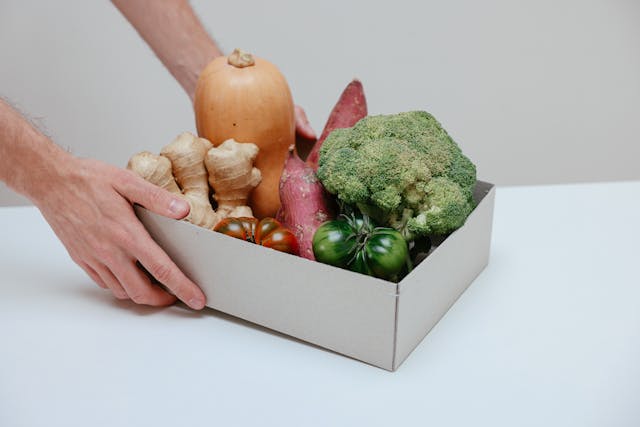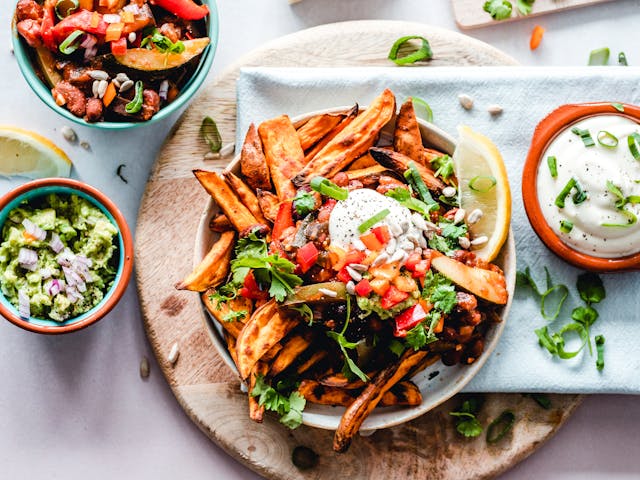The Rise of Plant-Based Eating: Health Benefits and Delicious Recipe
In recent years, plant-based eating has gained significant popularity, with more people embracing diets that focus on fruits, vegetables, legumes, whole grains, and nuts. Whether for health reasons, environmental concerns, or ethical beliefs, plant-based eating has become more than just a trend—it’s a lifestyle choice for many. In this article, we’ll explore the health benefits of a plant-based diet and share some delicious recipes to help you get started.

Understanding Plant-Based Eating
What Is Plant-Based Eating?
Plant-based eating refers to a diet that prioritizes foods derived from plants while minimizing or eliminating animal products such as meat, dairy, and eggs. It doesn’t necessarily mean following a strict vegan or vegetarian diet; rather, it’s about focusing on whole, nutrient-dense plant foods. People who adopt a plant-based diet may choose to reduce their consumption of animal products gradually or go fully plant-based depending on their preferences.
While some people may still eat small amounts of animal products, the goal of a plant-based diet is to include more plant-based foods in daily meals, such as vegetables, fruits, beans, lentils, tofu, and whole grains.
Health Benefits of Plant-Based Eating
Weight Management and Heart Health
One of the most well-known benefits of plant-based eating is its ability to support healthy weight management. Plant-based foods are typically low in calories and high in fiber, which can help promote satiety and reduce overeating. Fiber also plays a crucial role in supporting digestion and preventing constipation.
Furthermore, plant-based diets have been linked to improved heart health. Studies show that plant-based eating can lower cholesterol levels, reduce blood pressure, and decrease the risk of heart disease. This is likely due to the consumption of nutrient-rich foods like leafy greens, berries, nuts, and seeds, which are packed with antioxidants and healthy fats that promote cardiovascular health.
Better Blood Sugar Control
Plant-based diets may also benefit individuals with diabetes or those at risk of developing type 2 diabetes. The high fiber content in plant foods helps regulate blood sugar levels by slowing the absorption of glucose. Additionally, plant-based diets are typically lower in unhealthy fats and refined sugars, which can contribute to insulin resistance and blood sugar spikes.
Improved Digestion and Gut Health
A plant-based diet is rich in fiber, which is essential for good digestive health. Fiber helps promote regular bowel movements, supports gut bacteria, and lowers the risk of digestive disorders like irritable bowel syndrome (IBS) and colorectal cancer. The diverse range of plant foods also provides a wide variety of prebiotics, which are food sources for beneficial gut bacteria.
Environmental Benefits
In addition to health benefits, adopting a plant-based diet can also have positive effects on the environment. The production of plant-based foods generally has a lower environmental impact than animal agriculture, which requires significant resources such as water, land, and energy. By reducing animal product consumption, individuals can help reduce their carbon footprint and contribute to environmental sustainability.
Delicious Plant-Based Recipes to Try
1. Vegan Lentil Stew
This hearty and nutritious lentil stew is packed with plant-based protein and fiber, making it a perfect meal for those new to plant-based eating.
Ingredients:
-
1 cup green or brown lentils, rinsed
-
1 tablespoon olive oil
-
1 onion, diced
-
2 carrots, peeled and chopped
-
2 celery stalks, chopped
-
3 cloves garlic, minced
-
1 can (14.5 oz) diced tomatoes
-
4 cups vegetable broth
-
1 teaspoon cumin
-
1 teaspoon turmeric
-
Salt and pepper to taste
-
Fresh parsley for garnish (optional)
Instructions:
-
Heat olive oil in a large pot over medium heat. Add the onion, carrots, and celery, and sauté for 5-7 minutes until softened.
-
Add the garlic, cumin, and turmeric, and cook for another minute until fragrant.
-
Stir in the lentils, diced tomatoes, and vegetable broth. Bring to a boil, then reduce the heat to low and simmer for 25-30 minutes, or until the lentils are tender.
-
Season with salt and pepper to taste, and garnish with fresh parsley before serving.
2. Chickpea Salad Sandwich
This quick and easy chickpea salad is a plant-based twist on the classic tuna salad sandwich, offering a satisfying combination of protein and healthy fats.
Ingredients:
-
1 can (15 oz) chickpeas, drained and mashed
-
2 tablespoons vegan mayo
-
1 tablespoon mustard
-
1 tablespoon lemon juice
-
1 celery stalk, finely chopped
-
1/4 red onion, finely chopped
-
Salt and pepper to taste
-
2 slices whole grain bread
-
Lettuce leaves and tomato slices for garnish
Instructions:
-
In a bowl, mash the chickpeas with a fork or potato masher until mostly mashed but still slightly chunky.
-
Stir in the vegan mayo, mustard, lemon juice, celery, and red onion. Mix until well combined.
-
Season with salt and pepper to taste.
-
Spread the chickpea salad onto a slice of bread, and top with lettuce and tomato. Add the second slice of bread to make a sandwich, then serve.
3. Sweet Potato and Black Bean Tacos
These flavorful tacos are filled with roasted sweet potatoes, black beans, and topped with a tangy lime dressing. They’re perfect for a weeknight dinner or meal prep.
Ingredients:
-
2 medium sweet potatoes, peeled and diced
-
1 tablespoon olive oil
-
1 can (15 oz) black beans, drained and rinsed
-
1 teaspoon cumin
-
1 teaspoon chili powder
-
Salt and pepper to taste
-
8 small corn tortillas
-
1/2 red onion, thinly sliced
-
1 avocado, sliced
-
Fresh cilantro, chopped
-
Lime wedges

Instructions:
-
Preheat the oven to 400°F (200°C). Toss the diced sweet potatoes with olive oil, cumin, chili powder, salt, and pepper. Spread them on a baking sheet in a single layer and roast for 25-30 minutes, or until tender and lightly browned.
-
While the sweet potatoes are roasting, heat the black beans in a small saucepan over low heat until warmed through.
-
Warm the corn tortillas in a skillet over medium heat for about 1-2 minutes per side.
-
To assemble the tacos, layer roasted sweet potatoes, black beans, red onion, and avocado slices on each tortilla. Top with fresh cilantro and a squeeze of lime juice before serving.
Final Thoughts: Embracing Plant-Based Eating
The rise of plant-based eating is not just a passing trend; it’s a growing movement that offers numerous health benefits while promoting sustainability and compassion. By incorporating more plant-based meals into your diet, you can enjoy improved health, a reduced environmental impact, and the delicious flavors of wholesome, plant-powered foods.
Whether you’re fully committed to a plant-based lifestyle or just looking to explore more plant-based meals, these simple recipes can help you get started. Embrace the flexibility of plant-based eating and discover the joy of nourishing your body with vibrant, nutrient-rich foods.












